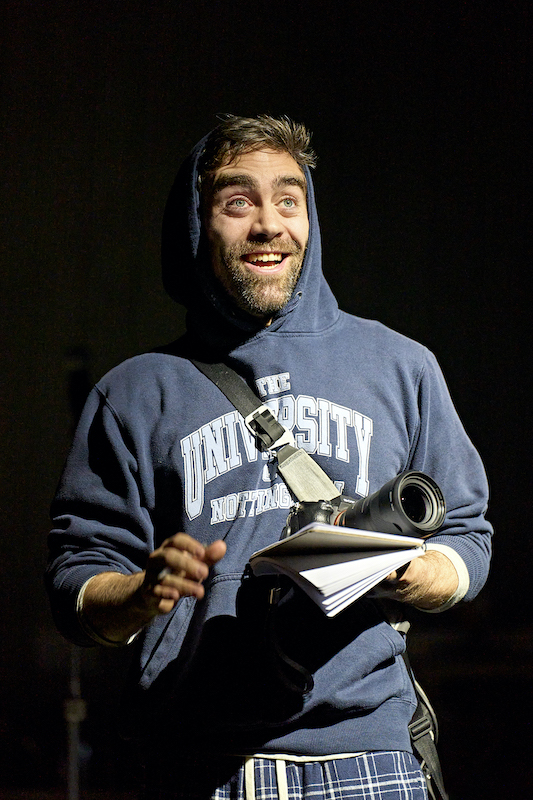Penelope Skinner’s new play is one of the most eccentric things I’ve seen in a long time. It’s undoubtedly entertaining, with an engagingly bonkers attempt by Kristin Scott Thomas to navigate an almost impossible role, perched between victim, diva and madwoman, equally reminsicent of Norma Desmond and one of the posh recluses from Grey Gardens. But tonally it’s exasperating, undecided whether it wants to be a #MeToo drama, a Tennessee Williams-infused tragedy, a fable, or comedy, with one moment that is literally trousers-round-your ankles farce.
And its message is depressingly defeatist; strange how a new play can make you feel that #Metoo and Times Up never happened.
Lily James, plays Kate, a low-level executive with Lilith, a film production company in London supposedly focused on women-driven stories. Scott Thomas is Elaine, a once famous actress, known for her scandalous relationships with older directors, who disappeared after the opening night of a play, 30 years ago.
It now seems that Elaine is alive and well in Cornwall, and eager to tell her story – which she claims has a #MeToo angle – in a new film. Kate’s boss (Doon Mackichan, pictured below left, with James) enlists her to go to Cornwall, meet Elaine, and determine the potential.  Elaine represents an intriguing mystery; but, before the play even leaves London, we’re inadvertently being asked to suspend our disbelief – in Kate. There’s something off in the character, both the writing and performance. Lily James has a tendency towards fidgety, teary, obsequious mannerism that not all directors seem able to manage, and Ian Rickson has failed to do so here. It’s impossible to think that the whimpering and chaotic Kate could hold down a film industry job for 10 minutes, let alone 10 years. And, even if the appalling nature of her marriage to film director Greg (James Corrigan) accounts for some of her behaviour, implausibility and irritation follow the character from one from scene to another.
Elaine represents an intriguing mystery; but, before the play even leaves London, we’re inadvertently being asked to suspend our disbelief – in Kate. There’s something off in the character, both the writing and performance. Lily James has a tendency towards fidgety, teary, obsequious mannerism that not all directors seem able to manage, and Ian Rickson has failed to do so here. It’s impossible to think that the whimpering and chaotic Kate could hold down a film industry job for 10 minutes, let alone 10 years. And, even if the appalling nature of her marriage to film director Greg (James Corrigan) accounts for some of her behaviour, implausibility and irritation follow the character from one from scene to another.
Ironically, Elaine is easier to believe, even when Scott Thomas enters wearing a swimming costume, fur coat and wellies, and wielding an axe, or is revealing her story via a melodramatically staged monologue for her guest, culminating in a disco dance routine. It turns out that she did experience a frightening ordeal involving one of her former lovers. And it does, for a time, appear that her experience 30 years ago, along with the subsequent exile in this crumbling old house, stuffed parrots hanging in a cage from the ceiling, has driven her a little mad. She’s certainly deluded if she thinks that a film company is going to let her play herself in a film. But Scott Thomas (who worked with Rickson in this theatre in both Betrayal and a fantastic Old Times 10 years ago) skilfully shows Elaine returning to life, revealing the kind of fortitude and humour that has got her this far.
 The fate of both Elaine’s "comeback" and Kate’s marriage will play out beneath the former’s leaky roof. The play’s title is taken from the name of the house, in turn named after the fabled Cornish kingdom swallowed up by the sea; in fact, the sea is, we’re told, crashing against the door. Skinner’s attempt to depict this place as some kind of magical haven for lost women (including Elaine’s poet neighbour, played by Sara Powell) will struggle to bear fruit, partly because Rickson and his design team fail to create any kind of atmosphere, partly because the playwright seems oddly intent on allowing the diabolical forces of husband and film world to prevail.
The fate of both Elaine’s "comeback" and Kate’s marriage will play out beneath the former’s leaky roof. The play’s title is taken from the name of the house, in turn named after the fabled Cornish kingdom swallowed up by the sea; in fact, the sea is, we’re told, crashing against the door. Skinner’s attempt to depict this place as some kind of magical haven for lost women (including Elaine’s poet neighbour, played by Sara Powell) will struggle to bear fruit, partly because Rickson and his design team fail to create any kind of atmosphere, partly because the playwright seems oddly intent on allowing the diabolical forces of husband and film world to prevail.
James is much stronger when going head-to-head with Corrigan’s controlling, casually monstrous Greg (pictured left). Ultimately, though, a work that restates the countless ways in which women are caged by men, or have their narratives dictated or stolen by them, involves a lead character whose behaviour would have many women locking her up and throwing away the key.















Add comment